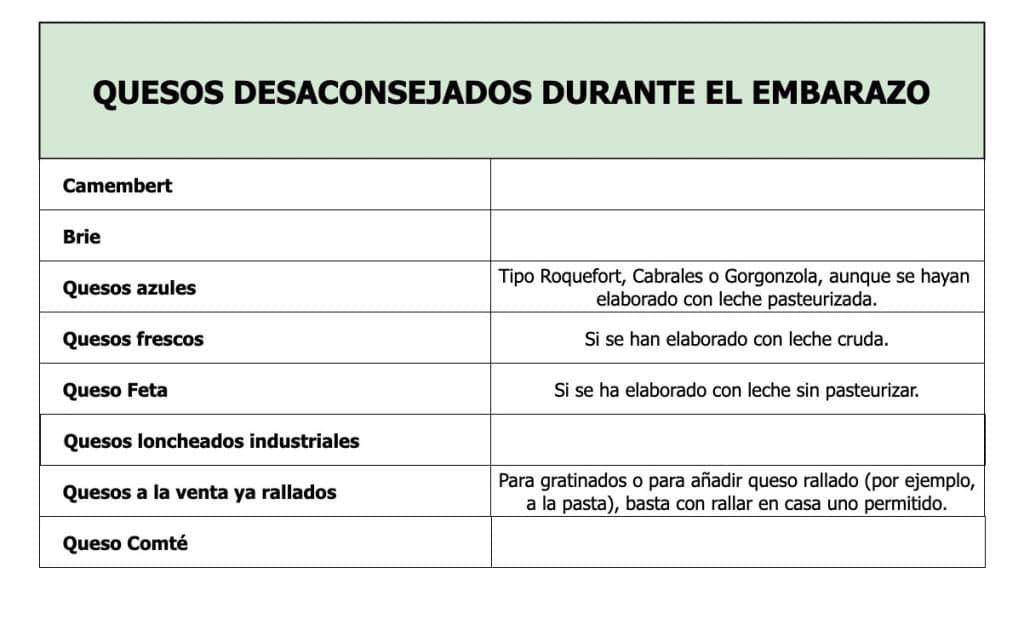
When a woman finds out that she is pregnant, one of the first things she should monitor is her daily diet, if she did not eat a healthy diet before. It is then that she is assaulted by questions about the myths and realities of forbidden foods. Along with the ham, the doubts about whether you can eat cheese during pregnancy.
There is no single answer to this question because, as we will see below, there are several factors that can influence that answer.
Why is cheese said to be dangerous or incompatible during pregnancy?
The idea that cheese is not a good food for pregnant women is based on the fact that it is a raw food. Therefore, it is associated with other foods and preparations that, according to Spanish Agency for Food Safety and Nutrition (AESAN) yes they are prohibited. Sushi, sashimi, or meat or fish carpaccio fall into this category. Also, raw eggs or preparations made with raw eggs, such as homemade mayonnaise or meringues.
Montserrat Martínez, professor in the area of Nutrition and Bromatology, at the University of Zaragoza, and a full academician at the Spanish Academy of Nutrition and Dietetics, points out that due to its condition as a raw food, “cheese could increase the risk of transmission of certain pathogenic microorganisms that can affect the fetus or even cause an abortion. Such would be the case of Listeria Monocytogenes.” Listerosis is “an infection with very varied symptoms, ranging from mild gastrointestinal symptoms to muscle pain or fever. In the most serious cases, in pregnant women it can affect the placenta and cause microabscesses.”
Despite this, the dietician-nutritionist maintains that Yes, cheese can be consumed during pregnancy, “as long as caution is taken with certain aspects.””, such as the milk with which they were made or the maturation time. That is, we must analyze which varieties are allowed because they do not entail risk.
What cheeses can a pregnant woman eat?
As the dietitian-nutritionist indicates, seeing cheese and pregnancy as a categorical prohibition is, in part, a myth:
- Pregnant women can consume all cow, goat, sheep or buffalo cheeses that have been made with pasteurized milk.
- he Burgos type fresh cheese It could also be consumed, but always checking that it has been made with pasteurized milk.
- It is allowed cured cheesessuch as Manchego, Tetilla cheese, Gruyère or Gouda, but it is better that they are made with pasteurized milk.
- he ParmesanAlthough it is made with raw milk, it has a high degree of curing, so it has a very low moisture content. This makes it difficult for microorganisms to grow. Still, it is better to stick with cheeses made with pasteurized milk.
What cheeses should a pregnant woman avoid?
Just because the list of cheeses allowed during pregnancy is long does not mean that I can eat all types of cheeses. Yes, there are some that are inadvisable. It is about the cheeses made from raw and unpasteurized milkbut also “the soft cheeses ripened with molds”.
The reason is that these types of cheeses contain more moisture than mature cheeses, which can encourage the growth of harmful microorganisms.

This is how you can tell if the cheese is made with pasteurized milk
From what we have seen so far, it is evident that one of the keys to knowing whether or not we can consume a certain cheese during pregnancy is what type of milk it is made with. And we know that if it is pasteurized milk, there is no risk.
As with many other doubts about nutritional content, origin or best-before date, the answer lies in mandatory labeling. “In order to know if the milk used is pasteurized, you must read on the label the list of ingredients. There it will indicate whether raw or pasteurized milk has been used.”
Why is it important to eat cheese during pregnancy?
The reason is simple: because cheese is a very nutritionally complete food. And it is especially interesting for its contribution of certain essential nutrients, especially many vitamins and minerals during pregnancy. Among them, “calcium, which helps the bone and dental development of the fetus, but also high-quality proteins. There are studies that indicate a positive relationship between the consumption of dairy products and derivatives such as cheese during pregnancy, and a significant increase in fetal growth and a lower risk of having a low birth weight baby.”
Tips for eating cheese during pregnancy
Knowing the important benefits of eating cheese during pregnancy, Montserrat Martínez only adds a few recommendations:
- Read the ingredient labels carefully, making sure that they have been made with pasteurized milk.
- Do not abuse highly aged cheeses because they have a very high saturated fat and sodium (salt) content. “Fresh cheeses or cottage cheese, and milk or other dairy derivatives, such as yogurt, should be preferred,” says the expert.
- The same thing happens with Parmesan cheese, its salt content is very high, so its consumption, without being discouraged, should be done in more moderation.
The entry Is it dangerous to eat cheese during pregnancy? was first published in Nutriiendo.







Thank you for your sharing. I am worried that I lack creative ideas. It is your article that makes me full of hope. Thank you. But, I have a question, can you help me?
Thank you for your sharing. I am worried that I lack creative ideas. It is your article that makes me full of hope. Thank you. But, I have a question, can you help me?
Can you be more specific about the content of your article? After reading it, I still have some doubts. Hope you can help me.
I don’t think the title of your article matches the content lol. Just kidding, mainly because I had some doubts after reading the article.